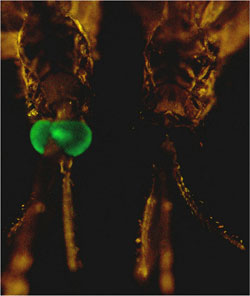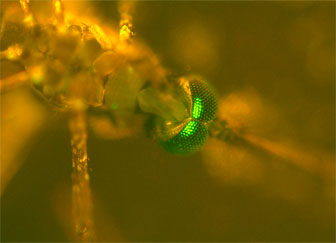Genetically engineered mosquitoes could help control malaria
Genetically engineered mosquitoes could help control malaria
mongabay.com
March 19, 2007
Globally, governments are spending hundreds of millions of dollars annually to reduce the impact of the malaria, a mosquito-borne disease that affects around 400 million people each year and kills one to three million die. Most of the victims are children in sub-Saharana Africa.

A transgenic mosquito (Left) with green fluorescent eyes, and a non-transgenic mosquito (Right), with no eye fluorescence. The transgenic mosquito carries a gene that confers resistant to the malaria parasite. |
While most of the focus to date has been on developing drugs that boost immunity to malaria or counteract the malaria parasite once it is in the victim’s bloodstream, scientists have now developed a treatment that focuses on the mosquito itself. The research, described in the early online edition of the journal Proceedings of the National Academy of Sciences (PNAS), uses a genetically engineered strain of malaria-resistant mosquito to out-compete natural mosquitoes when fed malaria-infected blood.
Mauro T. Marrelli, Chaoyang Li, Jason L. Rasgon, and Marcelo Jacobs-Lorena introduced equal numbers of mosquitoes genetically engineered to be resistant to malaria into natural mosquito populations. They found that after nine generations, “70% of the mosquitoes were transgenic versus 50% at the beginning of the experiment.”
They report that “this fitness advantage arose because the transgenic mosquitoes had a higher survival rate and laid more eggs,” according to PNAS. Their results further suggest that “transgenic and wild-type mosquitoes competed equally well when fed non-infected blood.”

A transgenic mosquito carrying a gene that confers resistance to the malaria parasite. The mosquito can be recognized as transgenic by the green fluorescence of the eye facets. |
The researchers say that further study is needed to determine whether mutant mosquitoes could help control malaria in natural settings, where only a small percentage of mosquitoes are exposed to malarial blood. They note that transgenic mosquitos would need to be able to out-compete wild mosquitoes in order to be effective. Nevertheless, the research is promising in that it could reduce the incidence of malaria without costly drugs or the need to control mosquitos through the use of insecticides like DDT which have been shown to cause ill-effects in some wildlife, espcially top-tier predators like eagles.
CITATION: Mauro T. Marrelli, Chaoyang Li, Jason L. Rasgon, and Marcelo Jacobs-Lorena (2007). Transgenic malaria-resistant mosquitoes have a fitness advantage when feeding on Plasmodium-infected blood. PNAS Online Early Edition for the week of March 19-23 , 2007







